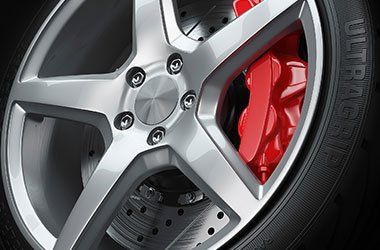Repairing, Maintain and Replacing Brakes, Wheels and Axles
Brakes
are pretty much the most important safety device on your car. If you’ve ever partially lost your brakes in the past, you’ll agree that it’s not something you want to experience again. Inspecting your brakes twice a year for wear and damage can protect you and your passengers. Additionally, it will also help save you money by catching any damage before it becomes too costly.
Regular Brake, Wheel and Axle Inspections Keep You Safer
The master cylinder, the heart of the vehicle’s braking system, holds the brake fluid when it is not being delivered to the brakes through the brake lines. If brake fluid leaks because the master cylinder is worn or brake lines are plugged or broken, the fluid cannot be delivered, and the brake pads will become ruined.
The brake fluid itself can become dirty or contaminated as it draws rust-causing moisture and picks up other debris, or it can break down from excess heat. Clean brake fluid is either clear or slightly yellow, while dirty brake fluid may be brown or even black. Old and dirty brake fluid can damage ABS brake systems internally.
The brake lines connect to the master cylinder through a combination valve, which combines a metering and proportioning valve. It regulates the pressure on the front and rear wheels to make sure both sets of brakes are applied simultaneously. A malfunctioning combination valve may cause the wheels to lock up.
Brake pads and shoes can be made of ceramic, metal or organic materials, while the disc rotors and drums they press against are made of metal. Because the pads and shoes create friction to stop the car, they gradually wear down over time and may wear away completely, letting the metal of the calipers and cylinders they are attached to grind against the rotors and drums and damage them. Some pads have a metal strip attached that sounds a warning whistle when the pad becomes too worn, but this strip sounds only when the car is in motion and the brakes are not applied.
Our Brakes, Wheel and Axle Services Include:
- Brake Replacement (Disc & Drum)
- Brake Calipers & Wheel Cylinders
- Master Cylinder & Brake Bleeding
- Power Brake Boosters
- Hydro-Vac Units (Hydro-Boost)
- ABS Diagnosis & Repair
- Brake Fluid Flushing
- Emergency Brake Repairs Machine Service (for all types of drums & rotors)
- Wheel Bearing Replacement &
- Repack (when applicable)
- Front & Rear CV (constant velocity)
- Axle Service & Boot Service
- Differential Repairs (both front & rear trans-axle & conventional)
- Drive-Shaft Service
- Suspension Inspection & Service
- Wheel Alignment (front & rear)
- Wheel Balance (using the Latest Technology w/ Force Variation available)
- We carry your favorite brand of tires
- and we can supply whatever our customers request
- Tire Rotation Service
- Tire Repair
- Power Steering Repairs
- Power Steering Flush Service
- Customer Wheel Service

